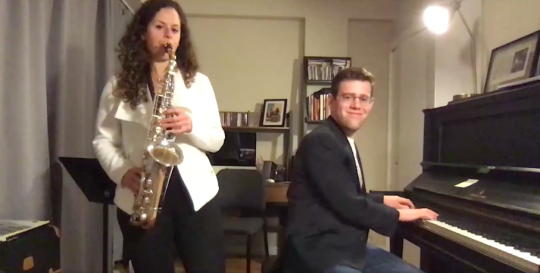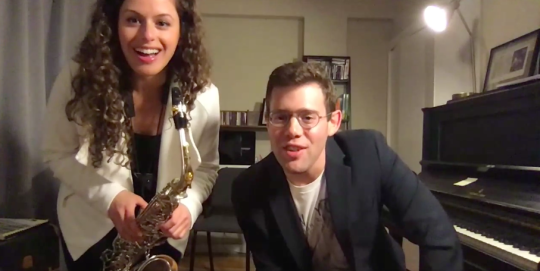COVID-19 | Connecting with Audiences in a Time of Isolation
Musicians Alexa Tarantino and Steven Feifke are livestreaming their music from their living room and raising funds for artists while doing it.
In this time of great uncertainty, artists of all disciplines are connecting with audiences in digital spaces like never before. Visual artists are giving virtual tours of their gallery shows and more are turning to selling work online (tips on how to do so via artnet News). Authors are reading chapters or poems from their books to online audiences; this example from The New York Times tells how children’s book authors Mo Willems, Gene Luen Yang, Amie Kaufman, and others are giving interactive presentations to kids who are now learning from home. Last week, Jessica Chen, founder and artistic director of J Chen Project, led 20-30 minute movement sessions via Zoom. The sessions opened up a new way of connecting and moving with others, and were designed for movers and non-movers alike.
Musicians, like jazz saxophonist Alexa Tarantino and pianist and composer Steven Feifke, have taken matters into their own hands by livestreaming shows from their living room. Tarantino and Feifke have held two concerts so far with two more upcoming on Sunday, March 29 and Sunday, April 5, with 25% of all proceeds going to NYFA. We spoke with Tarantino and Feifke to learn more about how they got started, and why these concerts matter now.
Click here for a link to all past and future concerts. All concerts take place at 8:00 PM EST.
NYFA: Can you tell us more about what inspired your first concert on Sunday, March 15, and why you chose to donate 25% of the proceeds to NYFA?
Alexa Tarantino: When all of this discussion of quarantine and lockdown started, we heard that some larger organizations in Europe were using livestream as a way to continue presenting their programs without bringing large groups of people together. After I returned from a tour, we self-quarantined for safety reasons. In an effort to still play and perform for people as much as possible, we decided to put on a livestreamed duo concert from our apartment. We knew about New York Foundation for the Arts because of various opportunities and grants that the organization offers for artists and wanted to help others in our situation.
Steven Feifke: As soon as the outbreak of COV-ID 19 started to go from bad to worse in the U.S. and many of my performance-based engagements were cancelled, I thought to myself that there had to be a way to continue to perform and reach people. Alexa and I talked about it and agreed that as a part of our series, we wanted to have a way to give back to the community and support other artists whose livelihood has been affected by the COV-ID 19 outbreak. We knew that any donations we made to NYFA would get to the people who needed it most.
NYFA: Can you speak to the losses that you and those in your community are currently experiencing as a result of COVID-19 (in terms of gigs, income, recording sessions, etc)?
AT: COVID-19 has definitely turned my work schedule upside down. All but a few of my events (domestic and international) through May have been cancelled. Some will be rescheduled at a later time, but many won’t. This is a large loss of income and also presents a challenge for bookings later in the spring and early summer, because we don’t know where things will go from here. However, this down time has been an opportunity to rest and recharge, and work on new music and projects. There is a silver lining!
SF: My professional career is mainly based around composing, arranging, and orchestrating. Although I have had several exciting performances and recordings get cancelled as a result of the outbreak of the virus, the majority of my work has not changed. I count myself lucky that I am still able to write music for upcoming albums and recording sessions, as well as teach masterclasses and private lessons out of my home studio. In fact, I am about to produce a project for Splice, and will be able to hire several musicians to record out of their home studios.
NYFA: How easy or difficult is it logistically to put on these concerts? Would you recommend the platform you used and do you know of others (beyond Facebook, YouTube, Instagram) that musicians and performers might be using?
AT: Presenting these concerts has been seamless thanks to Crowdcast. My assistant Maura discovered it and we will certainly be using it in the future! This is a platform that we decided to pay for, but we have loved the user experience so far. Concert attendees can “save their spot” for the event so we have an idea of how many will be viewing, and the program also sends a reminder email to the attendees, has a great chat/Q&A feature, donation feature, and more. We would recommend this but also have seen people present great programs on social media platforms including Facebook, YouTube, and Instagram.
SF: Crowdcast also archives each of our performances, so viewers are able to watch past concerts at their leisure.

NYFA: You mentioned it was your first time livestreaming a show. What was it like for you as performers, and can you describe how the experience differed from other live performances you’ve done?
AT: Yes this was our first time live-streaming and it was very interesting! While we can’t see or hear the audience, we could definitely feel their presence through their comments and “virtual applause.” Since we are performing from the comfort of our home, it does feel a little more free and like we can take our time with the presentation. There’s certainly less stress since there’s no soundcheck, stage lighting, equipment, contract, pack-up process, etc!
SF: Well—this was the first concert I have ever given while wearing slippers! All joking aside, there was a certain amount of comfort that I derived from playing on the piano I practice with, but I definitely missed the excitement of feeling a direct audience interaction. Our audience members did the next best thing and sent us “applause emojis” after every song, which was really nice.
NYFA: Do you think that presentations like these provide some element of comfort during such challenging times? What are your thoughts on the potential in this sort of presentation for reaching new audiences?
AT: Yes, we received great feedback from people who appreciated being able to listen to our music in their living rooms or during dinner. While it’s not the same as a live performance, I think it makes people feel less alone and reminds them of the beauty and purpose of art. We know that this idea of livestreaming performances has already spread across the world. We hope this encourages people to seek out other livestream events and we hope to be able to reach as many people as possible with our music.
SF: Personally, I am comforted by the fact that Alexa and I still have an outlet with which we can share our music and perform. I think that our friends, family, fans, and people we have become connected with through our performance careers are also glad to be able to tune in and hear us perform in this new setting. It’s not the same as an in-person concert, but everyone is doing their best to adapt to life under quarantine, and I think that this sort of presentation of the music brings us all closer together. We are going to continue this series next Sunday, March 29 by celebrating Charlie Parker’s centennial, and the following Sunday, April 5 with a concert featuring the music of Antonio Carlos Jobim. We hope that with each concert, we are able to reach new audiences—and hopefully see everyone at a live in-person concert soon!
-Amy Aronoff, Senior Communications Officer
If you need resources, please check our Emergency Grants page on NYFA’s website. We are updating it regularly as new funding comes in. You can find more articles on arts career topics by visiting the Business of Art section of NYFA.org. Sign up for NYFA News and receive artist resources and upcoming events straight to your inbox.
Images: Screenshots of Alexa Tarantino and Steven Feifke during their Sunday, March 22 concert.





